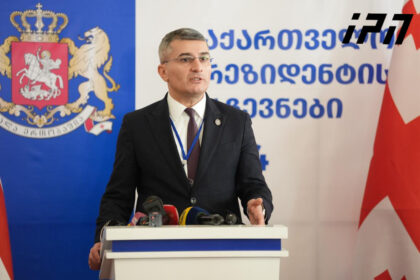**Georgian Court Denies Refugee Status to Turkish Citizen**
A court in Tbilisi, Georgia has refused to grant refugee status to a 57-year-old Turkish citizen of Georgian descent named Temur Katamadze. This decision means that he will likely be deported back to Turkey.
Katamadze is known for his activism and has been at the forefront of pro-EU protests in Batumi, a city on Georgia’s Black Sea coast. He has lived in Georgia since 2012 and has become an iconic figure in the country’s protests against the government.
According to Mariam Gabroshvili, a lawyer from the Georgian Young Lawyers’ Association, both the Tbilisi City Court and the Court of Appeals rejected Katamadze’s application for refugee status. This leaves him with little choice but to be deported back to Turkey.
Katamadze has been in detention since January 16 and had gone on a hunger strike for 48 days, which seriously deteriorated his health. He claims that the warrant for his arrest might also be related to his decades-long advocacy for the rights of the Georgian diaspora in Turkey.
Gabroshvili said that Katamadze believes he is being targeted by the Turkish state due to his activism. In 2023, he was informed that if he entered Turkey, he would be arrested and his life could be in danger. He claims that this story was fabricated, but his lawyer has confirmed that it was indeed a fabrication.
The Social Justice Center, which filed an amicus curiae brief in support of Katamadze, warned that his deportation could expose him to torture and discrimination.
This decision by the Georgian court has raised concerns about the country’s commitment to protecting its citizens’ human rights. Georgia has been under pressure from Turkey to deport Turkish nationals who are deemed to be a threat to national security.
Katamadze’s case highlights the complexities of migration law and the challenges faced by individuals who seek refuge in countries that may not always have the best track record when it comes to protecting their citizens’ human rights.
**Background**
Georgia has been hosting refugees from various countries, including Turkey. However, the country’s refugee policy has come under scrutiny in recent years due to concerns about the treatment of asylum seekers and refugees.
The European Union has also been pressuring Georgia to improve its asylum system and bring it in line with international standards.
Katamadze’s case is a stark reminder that even citizens who have made significant contributions to their host country can still face deportation. His story highlights the complexities of migration law and the need for countries to prioritize human rights, even when dealing with difficult cases like his.
**What does this mean for Katamadze?**
The refusal of refugee status by the Georgian court means that Katamadze will likely be deported back to Turkey. This could put him at risk of persecution and even torture, as he claims.
Katamadze’s lawyer has vowed to continue fighting for his client’s rights and to appeal the decision if necessary. However, it remains to be seen whether the Georgian court will reconsider its decision in light of new evidence or if Katamadze will ultimately have to face deportation.
**International implications**
The Katamadze case raises concerns about the treatment of asylum seekers and refugees in Georgia and the country’s commitment to protecting human rights. It also highlights the complexities of migration law and the need for countries to prioritize human rights, even when dealing with difficult cases like his.
As Georgia continues to navigate its relationships with European countries and Turkey, it will be important to monitor how this case is handled and what implications it has for the country’s refugee policy and overall commitment to human rights.












